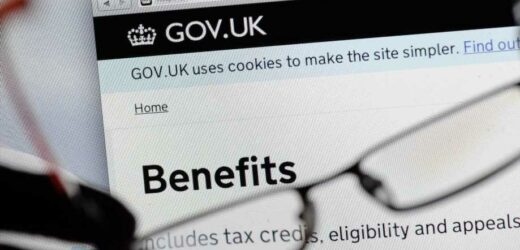MILLIONS of struggling households who claim Universal Credit and other benefits should take note of six changes coming this year.
Changes are coming to those claiming certain benefits including one that affects half a million on tax credits.
Tax credit claimants will be migrated across to Universal Credit this month.
It's vital to take note of how your new rules could soon affect your payment so that you don't fall short.
Here's six major changes that are coming into effect this year and how you can prepare:
Managed migration
From any time now, more benefit claimants on tax credits will be asked to claim Universal Credit instead.
Read more in money
Urgent warning to households on Universal Credit and benefits going on holiday
Millions on Universal Credit and benefits to get payment boost from today
Migration notices will be sent out to over 500,000 claimants currently in receipt of tax credits.
By migrating to Universal Credit, claimants will continue to receive the benefit they are entitled to through a modern benefits system.
Over two million people are still on old-style benefits like income support, but the government plans to move the majority of them onto Universal Credit by the end of 2024.
However, it's moving back the managed migration of people from employment and support allowance to 2028.
Most read in Money
Brits can get FREE cash to help with soaring energy bills – how to claim yours
Major high street brands close 10 shops tomorrow – is your local branch going?
Price of household essential soars by a QUARTER in blow to families
Urgent warning to households on Universal Credit and benefits going on holiday
The process began in May last year following a successful pilot in Harrogate, Yorkshire, in July 2019.
The full list of legacy benefits being moved across to Universal Credit includes:
- Housing Benefit
- Child Tax Credit
- Working Tax Credit
- Income Support
- Income-based Jobseeker's Allowance
- Income-related Employment and Support Allowance
You should have already received a letter detailing what you need to do – you'll need to claim Universal Credit within three months of it arriving.
If you don't make the claim your legacy benefit will stop, and you could be left with a hole in your finances.
For more help on what to do to prepare, we spoke to a benefits expert for some guidance.
Support for mortgage interest
The government has extended the Support for Mortgage Interest (SMI) loan scheme to a further 200,000 on Universal Credit.
The SMI helps those on Universal Credit – and other benefits – by giving them a low-interest loan.
The help goes towards mortgage payments or towards loans taken out to help repair any damage to the home.
The government has also changed the criteria claimants need to meet in order to get it.
From now on, those on Universal Credit will only need to be claiming the help for three months before they can use SMI.
Before, claimants had to be claiming Universal Credit for nine months and be unemployed for that long too.
The support will be automatically provided three months after your first payment but you don't have to use the help right away.
If you're worried about mortgage payments there is help out there.
Entitledto's free calculator works out whether you qualify for various benefits, tax credits and Universal Credit.
Use Policy in Practice's calculator to not only find out which benefits you could receive but also to find out how much cash you'll have leftover each month after paying for housing costs.
Charity Turn2Us' benefits calculator works out what means-tested benefits you might be entitled to, as well as whether you qualify for carers allowance.
Groups like Citizens Advice, StepChange and National Debtline can help you manage your debt.
Change to payment dates
Thousands of people claiming benefits could see a change to their payments within weeks
With more Bank Holidays coming up, claimants will want to keep a firm eye on when they might get their benefits.
If your payment date falls on a Bank Holiday then you'll most likely get it earlier.
You won't need to do anything – the payment will still be made and the amount won't change.
Here's when the DWP will make your payments around other public holidays.
- Early May bank holiday – payments will be made on May 1, instead money will arrive on April 28
- King Charles III's coronation bank holiday – Payments will be made on May 5, not May 8
- Spring bank holiday – May 26, not May 29
- Summer bank holiday – payments will be made on August 25, not August 28
- Festive period – payments due on December 25, 26 and 27 this year, will instead be paid on December 22
If you don’t receive your benefit payment one working day before the bank holiday, you should contact DWP directly.
You can also submit a complaint to them to get a problem sorted if your payment is wrong.
Changes to childcare allowance
The Chancellor's "back to work" Budget has further been used to encourage more than 700,000 parents on benefits to get a job or raise their hours with new measures.
Mr Hunt is introducing sweeping childcare changes to help mums and dads go to work.
Currently, parents can claim back 85% of their childcare costs – but they have to pay upfront first.
It means parents may have to find more than £1,000 for a month’s nursery care in advance before getting any support.
But childcare payments will soon be paid upfront rather than in arrears in a big win for the Sun’s Make Universal Credit Work campaign.
And the childcare allowance for claimants will be hiked from £646 a month for a single child to £950, and from £1,108 for two children to £1,630.
The hike comes alongside a huge £4billion childcare giveaway that will hand parents 30 free hours a week for one and two-year-olds.
It expands the existing 30 hours scheme for working parents of three and four-year-olds.
The exact date on which these changes will come into force hasn't been confirmed.
Extra cost of living payments
Millions of people on benefits and Universal Credit will get a one-off £900 cost of living payment.
The government confirmed when all three payments will be made last week.
A payment of £301 will be made directly into bank accounts between April 25 and May 17.
Those eligible for the tax-free payment are households receiving certain benefits, including Universal Credit.
One million households receiving tax credits will receive the first half of the cost of living payment from May 2.
The payments are part of a package of wider Government support announced to tackle the cost of living.
It includes a further £300 payment for eligible families in autumn, and then a payment of £299 in spring 2024.
There will also be a £150 cost of living payment for eligible people with certain disabilities.
Changes to work and rule sanctions
Over 100,000 Universal Credit claimants will have to step up their search for work or face having their benefits cut.
In his Spring Budget the Chancellor announced plans to raise the minimum amount they must work before having to engage with government jobs coaches.
The Administrative Earnings Threshold will rise from 15 to 18 hours per week.
It means anyone currently working fewer than 18 hours will have fresh requirements to meet with DWP officials to find more work.
And if they do not they risk having their benefits cut.
The government has also confirmed that it is strengthening the application of the Universal Credit sanctions regime.
This includes additional training for Jobcentre work coaches to ensure they are applying sanctions effectively, including for claimants who do not look for or take up employment.
Read More on The Sun
I helped my son have a baby AFTER he died – now I’m 68 and changing nappies
Stepmum splits opinion with OTT gown she picked out for daughter’s wedding
It also includes automating administrative elements of the sanctions process, including sending automated messages to claimants who fail to meet their work coach and take active steps to move into work or increase their earnings.
The exact date on which the new rules will come into force hasn't been confirmed but is expected to happen in the 2023/24 financial year.
Do you have a money problem that needs sorting? Get in touch by emailing [email protected]
Source: Read Full Article










